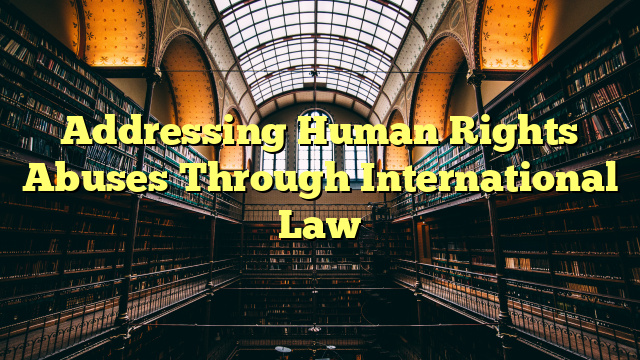Addressing Human Rights Abuses Through International Law
Table of Contents
- Introduction
- What are the International Laws that Protect Human Rights?
- How do You Address Human Rights Violations?
- What Can the UN Do About Human Rights Violations?
- What Human Rights are Addressed Within the International Bill of Human Rights?
- International Human Rights Conventions
- List of International Laws
Introduction
Human rights abuses are any act, including those of omission, that violate the fundamental rights of individuals and which are outlined in international law. They can range from torture and denial of basic needs, to freedom of association limits and discrimination. They can be perpetrated by individuals or by governments. Often, human rights abuses are carried out in an attempt to keep control and power over a population. It is the responsibility of states to protect the human rights of their citizens and to hold those responsible for abuses accountable.
What are the International Laws that Protect Human Rights?
International law is the body of legal rules that applies between sovereign states and other entities that are recognized as international legal persons under international law. It governs the relationships between states and regulates matters such as international trade, the environment, war and peace, and human rights. The main source of international law is the Charter of the United Nations, which was established in 1945.
The Universal Declaration of Human Rights, adopted by the United Nations General Assembly in 1948, is the first international document to recognize the fundamental human rights of all people. It is not a binding legal document, but it has been widely accepted and has been used as the basis for many international human rights treaties. The International Covenant on Civil and Political Rights (ICCPR) and the International Covenant on Economic, Social and Cultural Rights (ICESCR) are two of the most important international treaties that protect human rights. They were adopted by the UN General Assembly in 1966 and entered into force in 1976.
In addition to these international legal documents, there are also a number of regional treaties and conventions that protect human rights. These include the American Convention on Human Rights, the African Charter on Human and Peoples’ Rights, the European Convention on Human Rights, and the Arab Charter on Human Rights.
How do You Address Human Rights Violations?
One of the most effective ways to address human rights violations is through international law. International human rights law can provide remedies for individuals and communities affected by human rights abuses. It also provides a framework for states to take action to protect and promote human rights.
The UN plays an important role in addressing human rights abuses. The UN Human Rights Council is the main body at the UN responsible for protecting and promoting human rights. The Council is responsible for monitoring human rights situations around the world, and it can investigate human rights violations and make recommendations to the UN General Assembly and Security Council. The UN also has a number of special procedures to investigate and report on specific human rights issues, such as the right to food, the right to education, and the rights of persons with disabilities.
States have an obligation to take measures to protect and promote human rights, and to ensure that those responsible for human rights violations are held accountable. States can do this by passing laws to protect human rights, establishing national bodies to monitor human rights, and taking action against those who have committed human rights violations. International organizations, such as the UN, can also take action to protect and promote human rights. This includes bringing cases before international courts, imposing economic sanctions, and providing assistance to states to help them protect human rights.
What Can the UN Do About Human Rights Violations?
The UN plays an important role in addressing human rights violations. The UN Human Rights Council is responsible for monitoring human rights situations around the world and has the authority to investigate human rights violations and make recommendations to the UN General Assembly and Security Council. The UN also has a number of special procedures to investigate and report on specific human rights issues.
The UN can also take action


Violating human rights is unacceptable; international law should enforce harsher penalties.